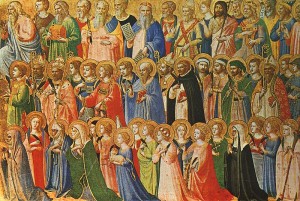After this I had a vision of a great multitude, which no one could count, from every nation, race, people, and tongue. They stood before the throne and before the Lamb, wearing white robes and holding palm branches in their hands. They cried out in a loud voice:
“Salvation comes from our God, who is seated on the throne and from the Lamb.”
All the angels stood around the throne and around the elders and the four living creatures. The prostrated themselves before the throne and worshiped God, and exclaimed:
“Amen. Blessing and glory, wisdom and thanksgiving, honor, power, and might be to our God forever and ever. Amen.”
Then one of the elders spoke up and said to me, “Who are these wearing white robes, and where did they come from?” I said to him, “My lord, you are the one who knows.” He said to me, “These are the ones who have survived the time of great distress; they have washed their robes and made them white in the blood of the Lamb.
For this reason they stand before God’s throne and worship him day and night in his temple; the one who sits on the throne will shelter them. They will not hunger or thirst anymore, nor will the sun or any heat strike them.
For the Lamb who is in the center of the throne will shepherd them and lead them to springs of life-giving water, and God will wipe away every tear from their eyes.”¹
When I was in college, I was like every other college kid: Ready to rebel, stretch the limits of my freedom, find my own version of the truth. As a result, I landed in a charismatic, evangelical protestant church that was active in campus ministry. Our pastor—God bless him—always greeted us by saying, “Howdy Saints!” in his characteristic Kentucky twang. There wasn’t much he taught me back in those days that stuck, but I will never forget how he used to call us saints. It still makes me smile.
You see, our Protestant brothers and sisters take a very literal view of the term as expressed in the bible. The word “saint” is a translation of the Greek word hagios which means, “the set apart one.” Therefore, all Christians are set apart by the indwelling of the Holy Spirit. The Roman Catholic and Orthodox Churches have a more nuanced understanding. I think this little article by Peter Kreeft is an excellent description of what a saint is. In it he says,
Saints are not freaks or exceptions. They are the standard operating model for human beings.
Today in the Roman Catholic Church we celebrate the Solemnity of All Saints. In the Orthodox Church, this feast is celebrated the Sunday after Pentecost, but the point is the same: to honor those who have, by heroic virtue, reached eternal blessedness with God, and to ask their prayers for the successful completion of our own pilgrimage.
When I read the words of St. John in the Revelation, I am cheered by the phrases, “a great multitude, which no one could count…” It reinforces my own personal belief that God will gather vast multitudes of men and women to His kingdom through His infinite love and mercy. It gives me great hope for my own salvation; that I too am becoming a saint.
¹Rev 7:9-17, NAB

